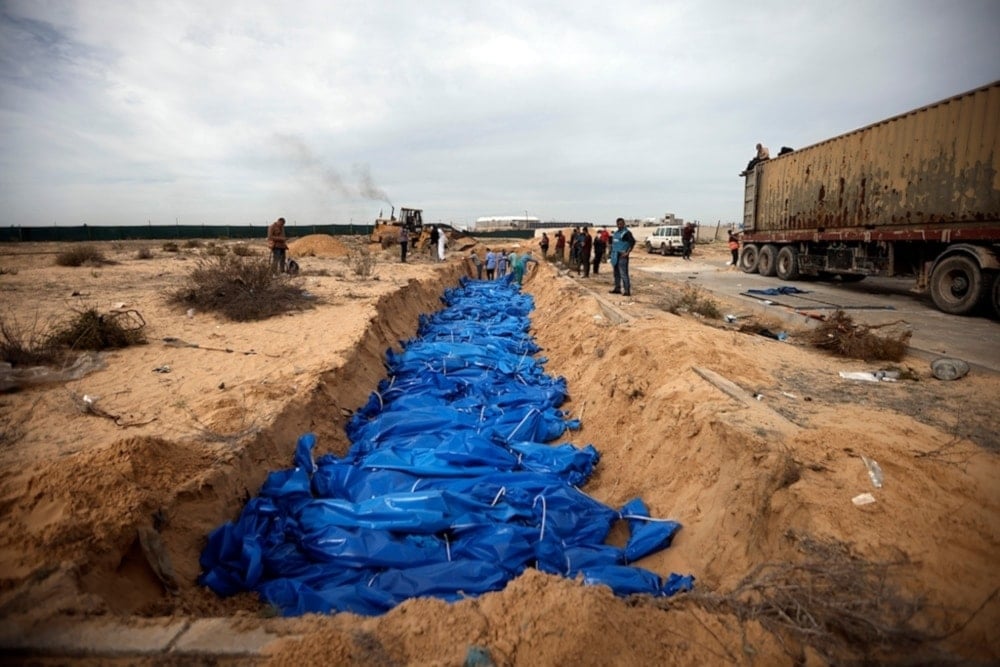Ireland seeks redefinition of genocide in ICJ case against 'Israel'
Ireland is actively rethinking how genocide is defined, pushing for a broader interpretation that reflects evolving global realities amid the ongoing brutal Israeli aggression on Gaza.
-

Palestinians bury people killed in the Israeli bombardment who were brought from the Al-Shifa Hospital, in a mass grave in the town of Khan Younis, southern Gaza Strip, Wednesday, November 22, 2023. (AP)
Ireland has declared its intention to intervene in South Africa's case against "Israel" at the International Court of Justice (ICJ), where it aims to push for an expanded interpretation of "genocide" under the Genocide Convention.
This move has sparked a lively debate, with some arguing that it represents an important step toward adapting the legal framework to address new and evolving forms of atrocity crimes in the modern world.
Others, however, perceive it as an attempt to reshape the legal definition of genocide in a way that aligns with political agendas.
ICJ can’t find Israel committing genocide so Ireland is requesting to change the definition of genocide.
— Open Source Intel (@Osint613) December 12, 2024
I swear you can’t make this up pic.twitter.com/qJBuemdqOU
The proposed redefinition could potentially broaden the scope of what constitutes genocide, moving beyond traditional interpretations to include acts that may not fit within the established legal framework but are nonetheless considered egregious violations of human rights.
The shift could have significant implications for how international law addresses future cases of mass violence and the protection of vulnerable populations.
Dive deeper
On Wednesday, the Irish government approved the decision to intervene in the case. Foreign Affairs Minister Micheál Martin stated that Ireland’s participation aims to "broaden the interpretation of what constitutes the commission of genocide by a State."
Martin expressed concern over the current understanding of genocide, saying, "A very narrow interpretation of what constitutes genocide leads to a culture of impunity in which the protection of civilians is minimized."
Ireland joins a growing coalition of countries supporting South Africa's case, including Brazil, Turkiye, Malaysia, Chile, Spain, Pakistan, and Syria.
South Africa initially filed the lawsuit in December 2023, alleging that the Israeli occupation's actions in Gaza violated the 1948 Genocide Convention.
In January 2024, the ICJ acknowledged the "plausible risk of genocide in Gaza" and the ongoing harm to civilians but stopped short of mandating a ceasefire. However, the court ordered the Israeli occupation to take all necessary measures to prevent further genocide.
Ireland had said in November it planned to join South Africa's case against "Israel" at the International Court of Justice (ICJ) by the end of the year.
This happened after the Irish parliament passed a non-binding motion stating that "genocide is being perpetrated before our eyes by Israel in Gaza."
"Israel" continues its intense siege on Beit Lahia, Beit Hanoun, and Jabalia, restricting the flow of aid to Palestinians in these areas. Meanwhile, the ongoing aggression on Gaza has resulted in the killings of 44,805 people and left 106,257 others wounded since October 7, 2023, according to Gaza's health ministry as of Wednesday. The humanitarian crisis continues to escalate, with widespread destruction and severe limitations on access to essential services for the affected population.

 3 Min Read
3 Min Read









